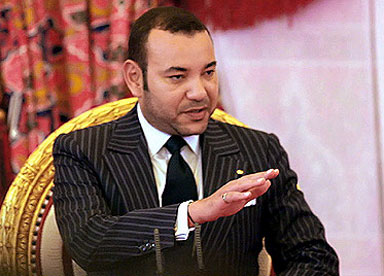 King Mohammed VI of Morocco has called for tangible initiatives and practical steps to preserve the rights of coming generations by taking decisions that will save the future of life on earth.
King Mohammed VI of Morocco has called for tangible initiatives and practical steps to preserve the rights of coming generations by taking decisions that will save the future of life on earth.
He noted that while the whole of mankind was pinning great hopes on resolutions, the issue required more than just a declaration of commitments and principles to curb greenhouse warming and mitigate its effects on humanity.
Addressing a plenary session at the Conference of Parties in Marrakech, the Moroccan capital, Mohammed said holding this conference in Africa was an incentive to give priority to tackling the adverse repercussions of climate change.
The situation, he observed, was growing worse and worse in the countries of the South and in insular states whose very existence was in jeopardy.
The event was also attended by United Nations Secretary General Ban Ki-moon, heads of states, ministers of states and other dignitaries.
Among them were presidents Mohammed Buhari of the Federal Republic of Nigeria, Mrs Ellen Johnson Sirleaf of Liberia, Robert Mugabe of Zimbabwe, and Ghana’s Vice-President Mr Kwesi Amissah-Arthur.
“The fact that the city of Marrakesh is today hosting this conference is evidence of the great importance we attach to issues associated with the environment and the climate,” Mohammed stated.
He said Morocco was among the first to have played a part in raising global awareness about climate change, adding that the last 15 years had witnessed the emergence of discourse on environmental issues and an increase in the number of NGOs involved in environmental advocacy.
“More importantly, this period has been marked by growing awareness of the importance of preserving the environment. Notwithstanding the emergence of such positive awareness, are we heading in the right direction? Is this joint course of action getting the necessary coordination and cooperation from all players?” he queried.
Mohammed said there were major differences among states and regions as far as environment-related culture was concerned, adding that priorities in industrialized countries were not the same as those in developing countries.
Additionally, he said there was a major gap between the two in terms of means and resources.
He said it might be natural for each party to defend its own interests, adding however that the decisions that were made and imposed were not always easy for some states to implement.
“Therefore, it has become necessary to unify education on environmental issues, and raise awareness about its defining role in preserving the future of mankind.”
In view of this, Mohammed suggested that countries must not be pressed from the start into accepting decisions they would be unable to comply with.
“This is not to say that they reject them. It only means that they do not have the necessary means to implement them,” he stated, and gave the assurance that Morocco would devote its efforts and allocate the financial resources available during this short period to discharge this difficult, noble mission.





